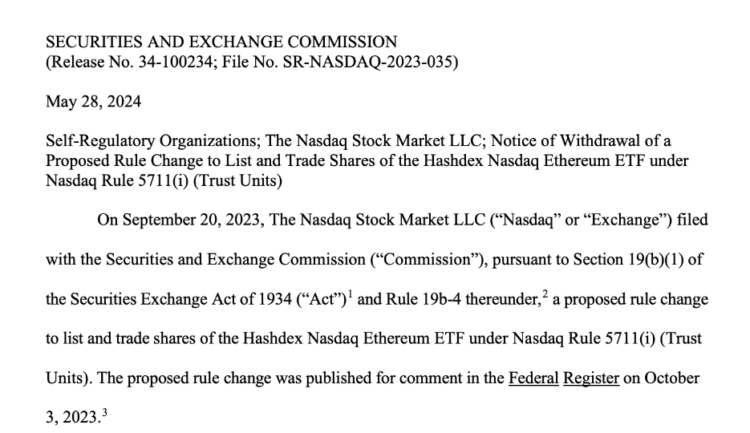Hashdex has reportedly withdrawn its application for a spot Ether exchange-traded fund (ETF), according to documents submitted to the US Securities and Exchange Commission (SEC).

Hashdex withdrew its application for a proposed rule change that would have permitted the launch of its Hashdex Nasdaq Ethereum ETF, according to a filing dated May 28. The financial watchdog revoked the proposal on May 24, just one day after eight comparable financial products found approval.
The rationale behind the decision remains undisclosed, as does the likelihood that Hashdex will resubmit its proposal.
Hashdex, according to a source with knowledge of the application, “no longer intends to proceed with a single asset Ether ETF.”

The SEC authorized the listing and trading of spot Ether ETFs on their respective exchanges on May 23 by approving the 19b-4 filings of VanEck, BlackRock, Fidelity, Grayscale, Franklin Templeton, ARK 21Shares, Invesco Galaxy, and Bitwise. The anticipated launch date for the funds is June.
In contrast to alternative contenders, Hashdex’s application for a spot Ether ETF aimed to mitigate potential manipulation by combining spot Ether holdings with Ether futures contracts on the identical product.
Other applicants, including Franklin Templeton, ARK 21Shares, and Fidelity, have amended their filings late to exclude support for ETH staking in response to SEC feedback and concentrate solely on spot-based Ether ETFs.
Hashdex’s ETF also aimed to replicate daily fluctuations observed in the Nasdaq Ether Reference Price to allay regulatory apprehensions regarding market manipulation. The company’s initial filing dated September 2023 states:
“Instead of holding 100% spot Ether, which could make it more susceptible to price manipulation in the spot market, the Fund will hold a mix of Spot Ether, Ether Futures Contracts, and cash.”
Hashdex is one of the issuers of Bitcoin spot ETFs that received approval in January. In the same way, the firm’s Bitcoin fund implemented a strategy distinct from that of other asset managers.
For example, Hashdex’s Bitcoin ETF procured spot BTC from physical exchanges within the CME market instead of relying on the Coinbase surveillance sharing agreement.
